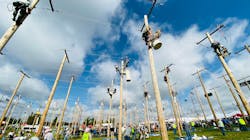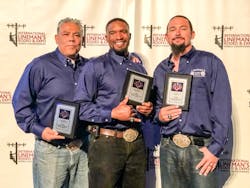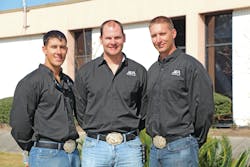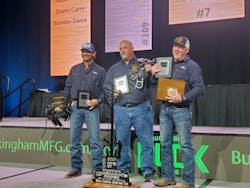International Lineman's Rodeo Flashback
Nearly 40 years ago, the first Lineman’s Rodeo took flight in Manhattan, Kansas. A dozen journeyman lineman teams showcased their safe work practices, demonstrated their skills and enjoyed the camaraderie of the line trade. Fast forward to last year, and the event soared to 242 journeyman teams and 366 apprentices.
For this year’s Lineman’s Supplement, we are taking a trip back in time to talk to a few of the Lineman’s Rodeo champions over the last 39 years. These journeyman lineworkers hail from different parts of the country, but they all have one thing in common—they were crowned as the best of the best in the International Lineman’s Rodeo competition.
For example, the Duke Energy journeyman team of Sandy Barnhill, Jay Tipton and Keith Griffin won the journeyman division in 2021. They're headed back to Kansas City again this October to compete at the 2023 International Lineman's Rodeo, but this time, they’ll be in the senior division.
“We’ve competed in the company Rodeo for 16 years and at the international level for eight years,” said Sandy Barnhill, a journeyman lineworker for Duke Energy in North Carolina. “This year, we're entering into a new era for our team, and we’re looking forward to it.”
Barnhill said the International Lineman’s Rodeo is not only a competition, but it gives linemen’s families and the community the opportunity to see lineworkers in action. His teammate, Jay Tipton, said his son was able to come on stage with him at the awards banquet, and Barnhill remembers having his team’s family members’ support on the sidelines.
“For us, it’s a wonderful thing because we get to get our families involved and engaged,” he said. “They run a stopwatch for us, yell at us and tell us things that we’re trying to pay attention to. The Rodeo really helps to solidify what gets done every day by hundreds of line techs. It heightens their awareness of the dangerous situations that everyone finds themselves in, and just how important the jobs are that linemen do to serve their communities every day.”
Lineworker Robert Hess of JEA in Florida also said the Rodeo plays an important role in the line trade. He won the competition back in 2013 with his teammates, and he’s now training up-and-coming apprentices to compete.
"Competitions like this one are important because they build up our skillset and help us with our day-to-day jobs, as well as with restoring power after natural disasters and during mutual aid,” he said. “It also helps in the safety aspect too, especially for apprentices. The practice you get from the Rodeo really makes you an asset to your company and your team.”
The following Lineman’s Rodeo champs will share their secrets to success, their favorite memories from the competition and their advice to other lineworkers looking to cross the awards stage at future competitions.
Two-Time Champs
- Team: Ramon Garcia, Jacob Lybbert and Wil Robinson
- Company: Southern California Edison
- Location: California
- Years won: 2016 and 2019
He and his teammates compete in at least four to five rodeos a year.
“We use them as a learning experience to prepare for the International Lineman’s Rodeo event,” he said.
When he and his team won the competition, he remembers three things—the nerves, the excitement and the celebration.
“In 2016, we won a few awards in different events, and as the end came, we knew we were in the running,” he said. “The biggest feeling other than joy was the proudest moment in my career to do something no one had accomplished at SCE.”
To succeed, competitors need teamwork, chemistry and practice. They must also stay composed and be efficient, he said. Now that the team has won twice, they are helping the next generation of lineworkers.
“We always attempt to bring new teams and hold practices with them,” Garcia said.
The team will compete together at the 2023 International Lineman’s Rodeo and is planning on going for the gold once again.
“We are still competing and hoping for a third championship,” he said.
He said the International Lineman’s Rodeo Week is very special to him and his team.
“All weekend long is awesome, and I love the Rodeo,” he said. “The best part of it for me is getting to talk to all competitors from different parts of the country. We may have to stay in competition to see the 40th Rodeo.”
Florida Trio
- Team: Robert Hess, Michael Corbitt and Brian Gregg
- Company: JEA
- Location: Jacksonville, Florida
- Year won: 2013
“For linemen, the Rodeo is the closest thing we have to a sport, so when I first heard about it, I had to sign up,” Hess said. “It seemed like a fun opportunity.”
His journeyman team, which also included Michael Corbitt and Brian Gregg, won the Rodeo in 2013, and he said his team’s bond was its strategy.
“The tasks you have to perform at the International Rodeo are usually a mystery until 24 hours before the competition, so it’s hard to prepare for it,” he said. “What made us win was our relationship, our work ethic and our desire to succeed. We all shared the same hunger and drive. We practiced day in, day out and eventually became brothers who learned each other’s strengths and weaknesses. This allowed us to be a solid team during practice, and an even stronger unit on competition day.”
To train for the Rodeo, his team practiced before work, after work and during lunch. He said they trained for the Rodeo like they trained for anything else because they knew the more they practiced, the better they would get.
“We spent every second at JEA’s training facility where we set up tasks that we thought they’d put in the mystery event,” he said. “We practiced everything there was to practice when it came to line work, so that on competition day, we’d be prepared regardless of the task they threw at us.”
The hard work paid off, and he said the most memorable experience was walking across the stage and winning the trophy.
“Winning the International Rodeo is like winning the Superbowl or World Series,” he said. “It makes you top dog for the year, and it’s something you never forget. It felt satisfying to know that all the hard work we put in on the training yard paid off.”
Today, he is now helping other Rodeo teams to prepare for the competition by serving as a coach for JEA apprentices who compete at the Rodeo. He orders all the materials, helps to build the training yard, attends practices, points out safety infractions and runs the stopwatch.
“I’m able to coach the guys based on everything I’ve learned and all the mistakes I made with my team during our practices,” he said.
While he is no longer competing, he plans to come to Rodeos to watch JEA’s apprentices in action. He also enjoys meeting other lineworkers from all over the world.
“Being able to communicate with people with the same background but completely different views and cultures was interesting,” he said. “It made me realize that we all do things differently.”
To be one of the top winners at the International Lineman’s Rodeo, it takes a lot of hard work and dedication, he said.
“If you’re not willing to practice day in and day out, devote all your time and sacrifice your days, it’s going to be hard to win top honors,” he said. “You have to be stubborn and be willing to work for it.”
Carolina Competitors
- Rodeo Competitors: Sandy Barnhill, Jay Tipton and Keith Griffin
- Company: Duke Energy
- Location: North Carolina
- Year won: 2021
Jay Tipton, lineworker for Duke Energy, in Marshall, North Carolina, said he’s been competing since 2006 and feels it’s a great way to perfect skills and learn from others. For his team, he said the keys to success are dedication, prayer and a good day.
“We just go out and do the best we can,” he said. “We try to stay focused and in control for the competition.”
To prepare, Tipton tried to keep himself in the best shape as possible, and he also spent time practicing with his teammates. The team got together after hours or on Saturday mornings, Barnhill added. “We would run through an event or two and just stay in step with each other,."
The team’s strategy was to communicate effectively, stick to the plan they developed and then go at it as hard as possible on the day of the event, Barnhill said. “To succeed, you must have a commitment to the trade and a willingness to find a team that you really jell with,” Barnhill said. “You have to have the same targets in mind to compete on that level.”
Winning the Rodeo requires teamwork and overcoming challenges. When competitors attend the awards banquet, he said there’s no guarantee they will even walk on stage.
“It’s humbling when you hear your teams number called,” he said. “It’s the unknown of doing your best and having a good day, but you just don't know.”
When the announcer did call his team’s name, however, and they were invited to walk across the stage, it was a surreal and awesome moment, Barnhill said. “I realized the talent in that room was extremely high and we were fortunate and blessed."
Tipton said it was a great feeling to have the chance to be recognized in front of his peers. Keith Griffin said he’ll never forget the feeling of the hard work his team put in through the years paying off.
“I remembered how we worked really well as a team and overcame the challenges,” he said. “It was humbling when they called out our number that we won.”
To be the best of the best, it takes more than speed—it requires no point deductions or penalties during the events, Griffin said.
“I think a lot of times the young teams get in their head that it's nothing but speed, but at the end of the day, if you can't do it right, you're never going to win the rodeo,” Griffin said. “I think a lot of it is that you have to be clean at the end of the day. You can be the fastest at every Rodeo, but if you don’t have the perfect score, you’re never going to win.”
Now that the team has years of experience, they are now helping the next generation of competitors.
“We’ve had a lot of good finishes in the Rodeo because other people have taken the time to help us out,” Tipton said. “So now we are trying to pass that experience on to the next teams. I’m just excited for the next generation. Every year it seems to get better and stronger.”
Barnhill agreed, saying that his team supports the Rodeo every chance they get by working with apprentices and teams desiring help to prepare for the competition.
“Our leadership in our local area has always been there for us so we definitely want to pass it on,” he said. “The Rodeo is an awesome time of year for us, and we look forward to the competition and family atmosphere that is experienced.”
Amy Fischbach ([email protected]) is the Field Editor for T&D World magazine.
Editor’s Note: Listen to the October 2023 Line Life Podcast episode at www.tdworld.com/podcasts to hear the 2021 Duke Energy winning journeyman team share their memories and strategies for the International Lineman’s Rodeo.
About the Author
Amy Fischbach
Electric Utilities Operations
Amy Fischbach is the Field Editor for T&D World magazine and manages the Electric Utility Operations section. She is the host of the Line Life Podcast, which celebrates the grit, courage and inspirational teamwork of the line trade. She also works on the annual Lineworker Supplement and the Vegetation Management Supplement as well as the Lineman Life and Lineman's Rodeo News enewsletters. Amy also covers events such as the Trees & Utilities conference and the International Lineman's Rodeo. She is the past president of the ASBPE Educational Foundation and ASBPE and earned her bachelor's and master's degrees in journalism from Kansas State University. She can be reached at [email protected].



